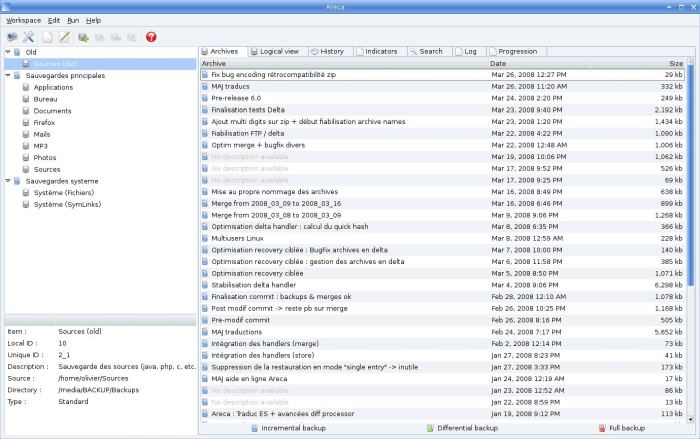Last Updated on July 14, 2023
Areca Backup is a file backup software developed in Java. It includes a transaction mechanism which guarantees the integrity of a backup.
The software allows users to select files or directories to backup, filter, encrypt and compress their content, and store them on a backup location.
Areca supports incremental backups and generates backup reports, which can be stored on disk or sent by email.
This application is intended for personal documents backup.
Areca supports incremental, differential and full backups.
Areca allows you to define a set of target. Each target defines :
– Which file or directory will be saved.
– A set of file filters to apply during backup.
– How to store your archives (with or without compression and encryption).
– Whether your backups are incremental or not.
– What must be done after backup (send report by email, launch shell script, merge archives, store report on disk).
These targets can be run with a graphical user interface or a command-line interface (the latter is useful for backup automation).
Features include:
- Archives compression (Zip & Zip64 format).
- Archives encryption (AES128 & AES256 encryption algorithms).
- Storage on local hard drive, network drive, USB key, FTP / FTPs server (with implicit and explicit SSL / TLS).
- Source file filters (by extension, subdirectory, regular expression, size, date, status, with AND/OR operators).
- Incremental, differential and full backup support.
- Archives merges / deletion : Merge contiguous archives in one single archive or safely delete the latest archives.
- As of date recovery : Recover archives (or single files) as of a specific date.
- Transaction mechanism: All critical processes (such as backups or merges) support a transaction mechanism (with commit / rollback management) which guarantees backups’ integrity.
- Backup reports : Generate backup reports that can be stored on disk or sent by email.
- Post backup scripts : Launch shell scripts after backup.
- Files permissions and symbolic links backup.
- Support for delta backup (store only the modified parts of the files – not the whole files).
- Archives content explorer (including a ‘find file in archives’ feature).
- Archive description : A manifest is associated to each archive, which contains various information such as author, title, date, description, and some technical data.
- File history explorer : Keeps track of file’s history (creation / modifications / deletion) over archives.
- Backup simulation : useful to check whether a backup is necessary.
- User’s actions history : Areca keeps an history of all user’s actions (archives deletion, merges, backups, recoveries).
- Command-line interface which can be used for backup automation.
Website: Discontinued
Support:
Developer: Olivier Petrucci
License: GNU GPL v2

Areca Backup is written in Java. Learn Java with our recommended free books and free tutorials.
| Popular series | |
|---|---|
| The largest compilation of the best free and open source software in the universe. Each article is supplied with a legendary ratings chart helping you to make informed decisions. | |
| Hundreds of in-depth reviews offering our unbiased and expert opinion on software. We offer helpful and impartial information. | |
| The Big List of Active Linux Distros is a large compilation of actively developed Linux distributions. | |
| Replace proprietary software with open source alternatives: Google, Microsoft, Apple, Adobe, IBM, Autodesk, Oracle, Atlassian, Corel, Cisco, Intuit, and SAS. | |
| Awesome Free Linux Games Tools showcases a series of tools that making gaming on Linux a more pleasurable experience. This is a new series. | |
| Machine Learning explores practical applications of machine learning and deep learning from a Linux perspective. We've written reviews of more than 40 self-hosted apps. All are free and open source. | |
| New to Linux? Read our Linux for Starters series. We start right at the basics and teach you everything you need to know to get started with Linux. | |
| Alternatives to popular CLI tools showcases essential tools that are modern replacements for core Linux utilities. | |
| Essential Linux system tools focuses on small, indispensable utilities, useful for system administrators as well as regular users. | |
| Linux utilities to maximise your productivity. Small, indispensable tools, useful for anyone running a Linux machine. | |
| Surveys popular streaming services from a Linux perspective: Amazon Music Unlimited, Myuzi, Spotify, Deezer, Tidal. | |
| Saving Money with Linux looks at how you can reduce your energy bills running Linux. | |
| Home computers became commonplace in the 1980s. Emulate home computers including the Commodore 64, Amiga, Atari ST, ZX81, Amstrad CPC, and ZX Spectrum. | |
| Now and Then examines how promising open source software fared over the years. It can be a bumpy ride. | |
| Linux at Home looks at a range of home activities where Linux can play its part, making the most of our time at home, keeping active and engaged. | |
| Linux Candy reveals the lighter side of Linux. Have some fun and escape from the daily drudgery. | |
| Getting Started with Docker helps you master Docker, a set of platform as a service products that delivers software in packages called containers. | |
| Best Free Android Apps. We showcase free Android apps that are definitely worth downloading. There's a strict eligibility criteria for inclusion in this series. | |
| These best free books accelerate your learning of every programming language. Learn a new language today! | |
| These free tutorials offer the perfect tonic to our free programming books series. | |
| Linux Around The World showcases usergroups that are relevant to Linux enthusiasts. Great ways to meet up with fellow enthusiasts. | |
| Stars and Stripes is an occasional series looking at the impact of Linux in the USA. | |